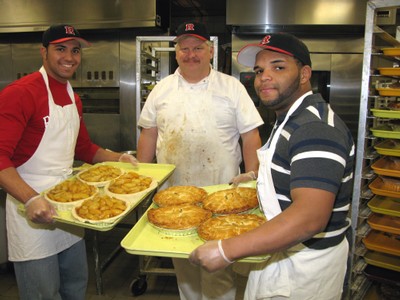University community rallies to help residents and find solutions
RAH also helped establish an emergency food pantry at the Greater Brunswick Charter School in New Brunswick after teachers noticed that some students were coming to school hungry because they hadn’t had enough to eat. Food donated by Rutgers faculty, staff and students helped stock the shelves, while the Interfraternity Council cleaned and painted the facility.
Rutgers President Richard L. McCormick established Rutgers Against Hunger in November 2008. Among its accomplishments, the initiative has helped call attention to the increasing pressures on volunteer and nonprofit agencies, including food banks, emergency food pantries and soup kitchens, and underscore the need for both short- and long-term solutions.
“Too many of our fellow New Jersey residents are struggling to provide food for themselves and their families,” McCormick said. “Rutgers felt the need to seek solutions through a comprehensive program not only of collecting food but also incorporating education, research and service. The first months of Rutgers Against Hunger have shown that our community is eager to give unselfishly of its time, talents and resources to help those in need.”
Through its website, http://rah.rutgers.edu/, and on- and off-campus activities, the initiative has generated statewide support and corporate partnerships. This month, for example, RAH worked with Verizon to launch food drives at 11 offices in New Jersey and New York. More than a ton of food was collected in just a week. Waste Management Inc. of New Jersey also has partnered with Rutgers, donating hundreds of containers used to collect food in buildings across campuses.
“We’re very appreciative of the contributions by Verizon employees and the Waste Management organization to the success of Rutgers Against Hunger,” said Leslie Fehrenbach, university secretary and co-executive director of RAH. “Their efforts support the mission of RAH and also serve as a model for future partnerships with the private sector.”
In addition to targeting the short-term, pressing need to feed the hungry, RAH also has addressed the complex issues of food security. Rutgers’ ongoing research in such areas as nutrition, agriculture and food science and the outreach work of Rutgers Cooperative Extension are key components.
“The integration of teaching, research and extension programs to address societal needs is the proud foundation of Rutgers as a land-grant institution,” said Robert M. Goodman, executive dean of the School of Environmental and Biological Sciences (SEBS).
Hundreds of Rutgers students, faculty and staff on all campuses have participated in RAH programs. Here is a sampling:
• Rutgers’ nutritional science students visited facilities across the state to educate families of limited resources about nutrition, food shopping and preparation.
• Dozens of research projects by SEBS faculty associated with the New Jersey Agricultural Experiment Station are exploring such areas as blueberry and cranberry breeding, crop pollination, food contamination, preservation of fresh-cut produce, vitamin metabolism during pregnancy and consumer attitudes toward food biotechnology.
• RAH designed a survey for Mercer Street Friends, a regional food bank and social service organization in the Trenton area, so it could learn more about its clients.
• Hundreds of students donated the cost of a meal in a meal sign-away event at campus dining halls that raised $15,000.

• Members of the Student Volunteer Council in New Brunswick and students from Rutgers-Newark spent a day working at the Community FoodBank of New Jersey in Hillside.
• Students and faculty gathered 2 tons of fresh produce for donation to Farmers Against Hunger in a gleaning at Giamarese Farm in East Brunswick.
• Students at Rutgers-Newark sponsored a forum on poverty, hunger and homelessness to educate their community about assisting those in need.
• The Rutgers-Camden campus has had an ongoing campuswide food drive to benefit the Community FoodBank of South Jersey.
• Rutgers alumni collected food during Reunion Weekend in May and 70 alumni volunteered at the Community FoodBank of New Jersey in April.
• Rutgers administrators and staff organized competitions and other events among buildings and within departments to rally employees for contributions.
In the coming weeks and months, a community-based farmer’s market, funded by Johnson & Johnson and operated through the School of Environmental and Biological Sciences and the New Jersey Agricultural Experiment Station, will open in New Brunswick. Student volunteers will be trained to help people file for food stamps, and a new statewide service-learning program focused on preventing hunger and related social ills will be developed.
Plans for next year include developing a program to train residents in urban and suburban areas to grow food for local consumption; establishing student internships with RAH and local food pantries; inviting other colleges and universities to a “hunger summit”; creating more partnership opportunities with the private sector on projects addressing hunger and food insecurity; and seeking grant support for research initiatives in food safety, nutrition and related areas.
Media Contact: Sandra Lanman
732-932-7084, ext. 621
E-mail: slanman@ur.rutgers.edu